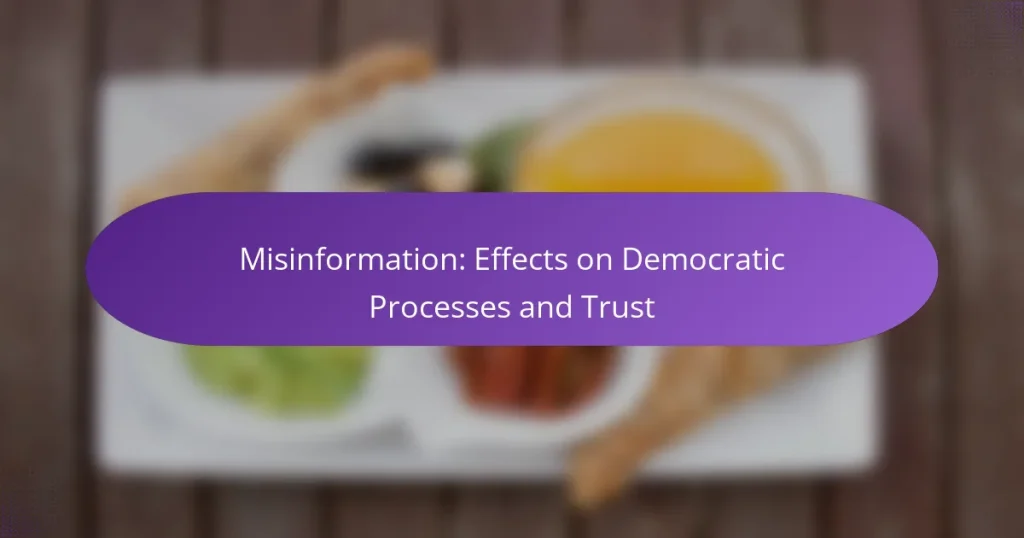Misinformation poses a serious threat to democratic processes by undermining trust in institutions and distorting public perception. This distortion can result in misguided voting decisions and a pervasive disillusionment with the electoral system, ultimately leading to a disengaged electorate. Addressing this issue necessitates a comprehensive strategy that promotes media literacy and responsible information sharing.
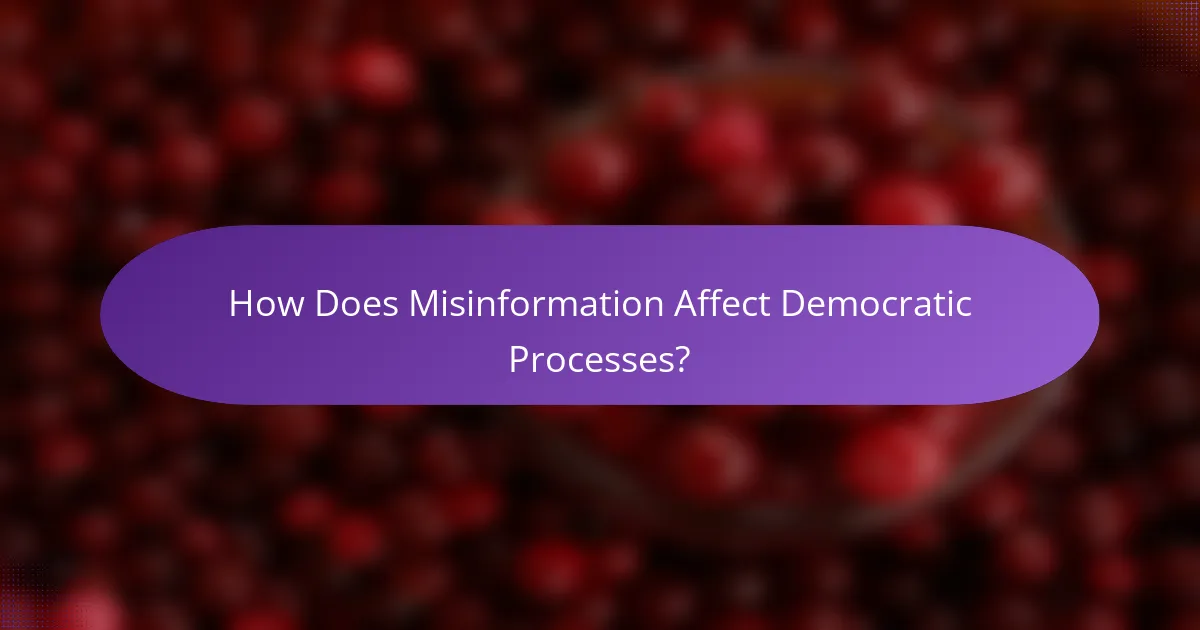
How Does Misinformation Affect Democratic Processes?
Misinformation significantly disrupts democratic processes by eroding trust in institutions and skewing public perception. It can lead to misguided voting decisions and a general disillusionment with the electoral system.
Undermines voter trust
Misinformation creates doubt about the integrity of elections and the motives of political actors. When voters encounter false information, they may question the legitimacy of candidates and the electoral process itself, leading to decreased participation.
For example, claims about voter fraud can discourage individuals from voting, fearing their efforts are futile. This erosion of trust can result in lower voter turnout, which undermines the democratic principle of representation.
Distorts public opinion
Misinformation can shape public opinion by spreading false narratives that resonate with specific audiences. This distortion can polarize communities, making it difficult to reach consensus on critical issues.
Social media platforms often amplify misleading information, allowing it to spread rapidly. As a result, public debates may become dominated by extreme viewpoints rather than balanced discussions, further complicating the democratic process.
Influences election outcomes
The impact of misinformation can directly influence election results by swaying undecided voters or reinforcing existing biases. When voters are exposed to misleading information, their choices may be based on false premises rather than factual data.
In recent elections, targeted misinformation campaigns have been shown to affect voter behavior significantly. Strategies to combat this include promoting media literacy and encouraging critical evaluation of sources to ensure informed voting decisions.
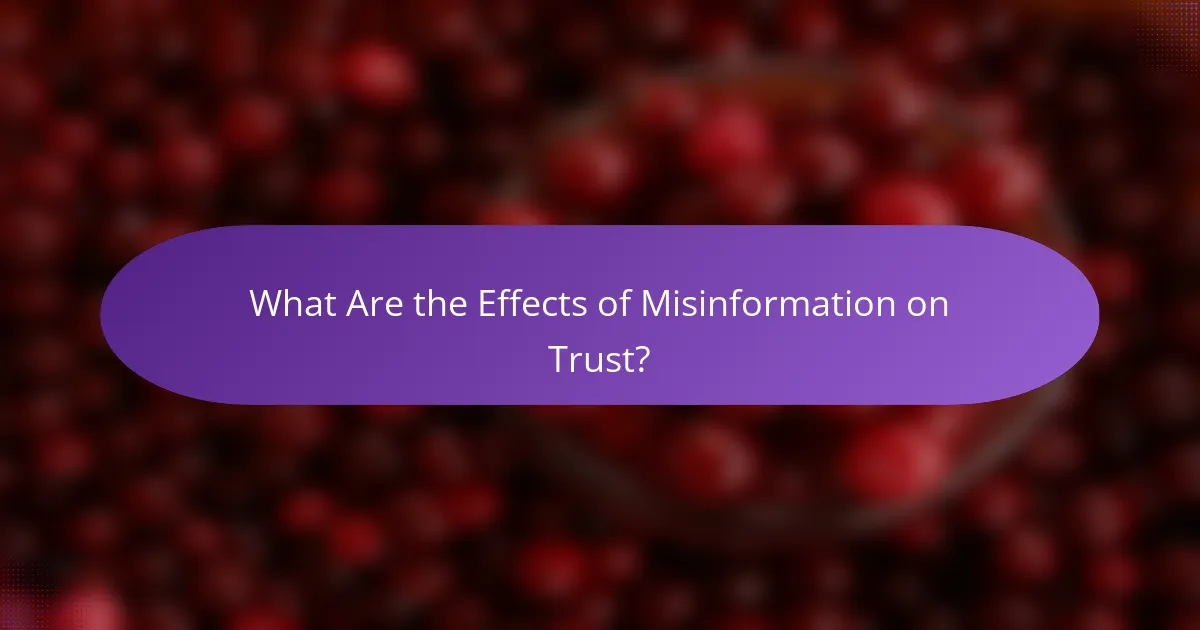
What Are the Effects of Misinformation on Trust?
Misinformation significantly undermines trust in democratic processes by creating confusion and skepticism towards institutions and information sources. This erosion of trust can lead to a disengaged electorate and a fragmented society, where individuals rely on biased or false information.
Erodes institutional credibility
Misinformation can severely damage the credibility of institutions such as governments, media, and educational organizations. When false narratives proliferate, they can lead the public to question the integrity and reliability of these entities, resulting in a loss of faith in their actions and decisions.
For example, when misinformation about election processes circulates, it can cause citizens to doubt the legitimacy of election outcomes. This skepticism can persist even in the face of factual evidence, creating a cycle of distrust that is difficult to break.
Increases polarization
The spread of misinformation often amplifies divisions within society, leading to increased polarization among different political or social groups. When individuals consume information that aligns with their pre-existing beliefs, they become more entrenched in their views, making constructive dialogue challenging.
Social media platforms can exacerbate this issue by creating echo chambers where misinformation thrives. As people become more isolated in their beliefs, the potential for bipartisan cooperation diminishes, further fracturing the democratic process.
Reduces civic engagement
Misinformation can lead to reduced civic engagement as individuals become disillusioned with the political system. When citizens encounter conflicting information, they may feel overwhelmed and choose to disengage rather than participate in democratic processes like voting or community involvement.
To combat this, it is essential for citizens to seek out reliable sources of information and engage in critical thinking. Encouraging open discussions and promoting media literacy can help counteract the negative effects of misinformation and foster a more informed electorate.

What Strategies Can Combat Misinformation?
Combating misinformation requires a multifaceted approach that includes fact-checking initiatives, media literacy programs, and regulatory frameworks. These strategies aim to enhance public awareness, improve critical thinking, and establish guidelines for responsible information dissemination.
Fact-checking initiatives
Fact-checking initiatives play a crucial role in identifying and correcting false information. Organizations like Snopes and FactCheck.org assess the accuracy of claims circulating in media and social platforms, providing reliable sources for the public to verify information.
These initiatives often collaborate with social media companies to flag misleading content and provide context. For example, Facebook has partnered with third-party fact-checkers to review posts and reduce the spread of false claims.
Media literacy programs
Media literacy programs educate individuals on how to critically evaluate information sources and recognize misinformation. These programs can be implemented in schools, community centers, or online platforms, teaching skills such as source verification and understanding bias.
For instance, workshops may guide participants through the process of assessing the credibility of news articles or social media posts. By fostering these skills, individuals become more discerning consumers of information, which can significantly reduce the impact of misinformation.
Regulatory frameworks
Regulatory frameworks establish guidelines for information dissemination, aiming to hold platforms accountable for the content they host. Countries like Germany have implemented laws requiring social media companies to remove hate speech and false information promptly.
These regulations can encourage platforms to invest in better moderation tools and practices. However, balancing regulation with freedom of expression remains a challenge, necessitating ongoing dialogue among stakeholders to ensure fair practices while combating misinformation.
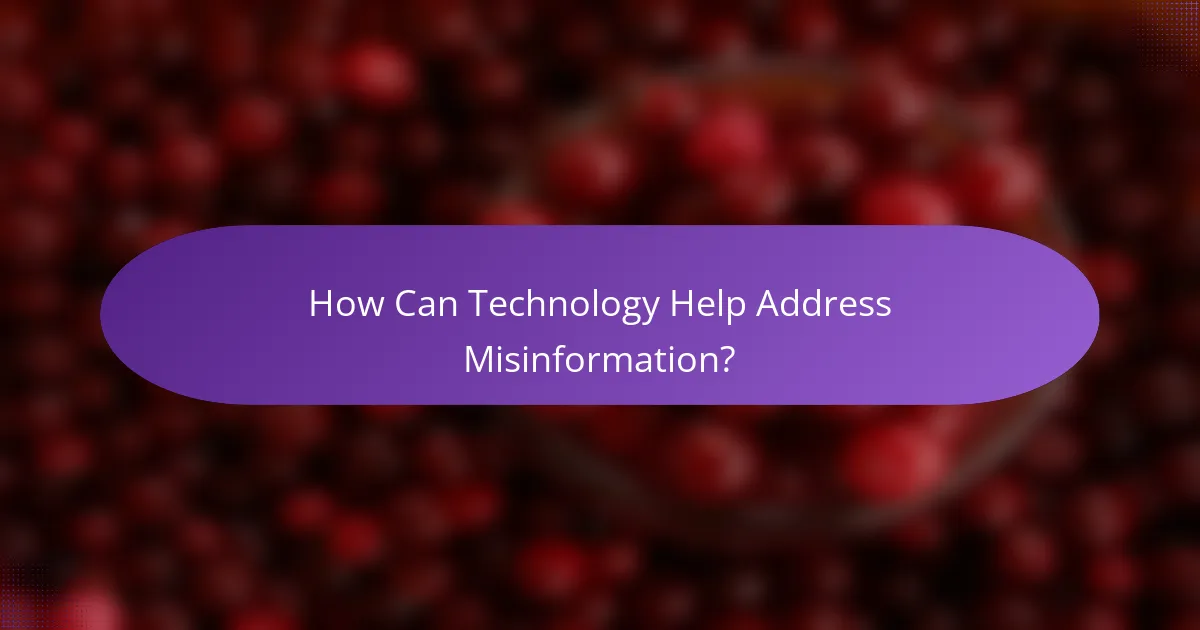
How Can Technology Help Address Misinformation?
Technology can play a crucial role in combating misinformation by enhancing content verification, improving information dissemination, and fostering transparency. Various tools and systems, such as AI-driven moderation, algorithm adjustments, and blockchain technology, can help restore trust in democratic processes.
AI-driven content moderation
AI-driven content moderation utilizes machine learning algorithms to identify and filter out misleading or false information on platforms. These systems analyze text, images, and videos to assess credibility, often flagging content for further review by human moderators.
While effective, AI moderation can sometimes misinterpret context, leading to false positives. It’s essential for platforms to continuously refine their algorithms and incorporate user feedback to improve accuracy.
Social media algorithms
Social media algorithms can be adjusted to prioritize credible sources and factual information over sensational or misleading content. By promoting authoritative voices and reducing the visibility of unverified claims, platforms can help users access more reliable information.
However, algorithm changes must be carefully managed to avoid censorship or bias. Transparency about how these algorithms work and regular audits can help maintain user trust and ensure a balanced information ecosystem.
Blockchain for transparency
Blockchain technology offers a decentralized method for verifying the authenticity of information. By recording data in a tamper-proof manner, blockchain can provide users with a clear trail of content origin, helping to establish trust in the information shared online.
Implementing blockchain solutions requires collaboration among tech companies, governments, and civil society to create standards and ensure accessibility. While promising, the technology is still developing, and widespread adoption may take time.
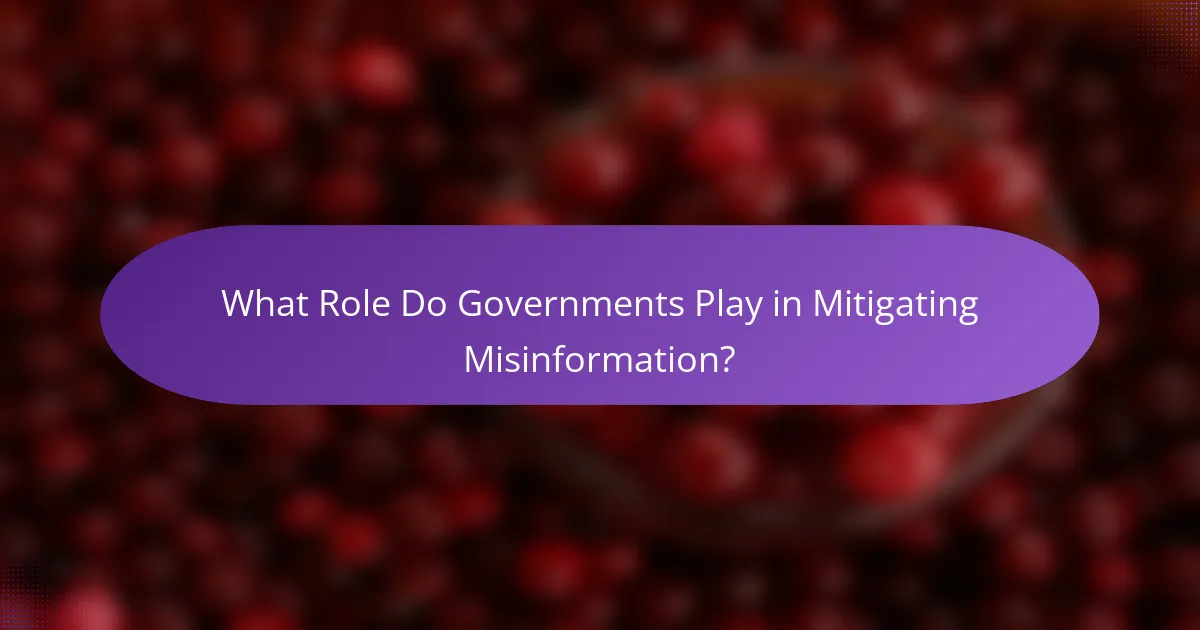
What Role Do Governments Play in Mitigating Misinformation?
Governments play a crucial role in addressing misinformation by implementing policies, raising public awareness, and collaborating with technology companies. These efforts aim to protect democratic processes and foster trust among citizens.
Policy development
Effective policy development is essential for combating misinformation. Governments can create regulations that promote transparency in media and social platforms, ensuring that users can identify credible sources. For example, some countries have enacted laws requiring platforms to label or remove false information promptly.
Additionally, policies can include penalties for spreading misinformation that undermines public health or safety. These measures help to establish a framework that discourages the dissemination of false information while protecting freedom of speech.
Public awareness campaigns
Public awareness campaigns are vital for educating citizens about misinformation and its effects on society. Governments can launch initiatives that inform the public about how to recognize false information and verify sources. These campaigns often utilize various media, including social networks, television, and community events.
For instance, campaigns may provide practical tips, such as checking the credibility of sources or cross-referencing information before sharing. Engaging the public in discussions about the importance of accurate information can foster a more informed citizenry.
Collaboration with tech companies
Collaboration with technology companies is a key strategy for governments to effectively mitigate misinformation. By partnering with social media platforms and search engines, governments can enhance content moderation efforts and improve the identification of false information. This cooperation can lead to the development of better algorithms that flag misleading content.
Moreover, governments can encourage tech companies to invest in tools that promote fact-checking and transparency. For example, initiatives that allow users to report misinformation can empower the public to take an active role in combating false narratives.
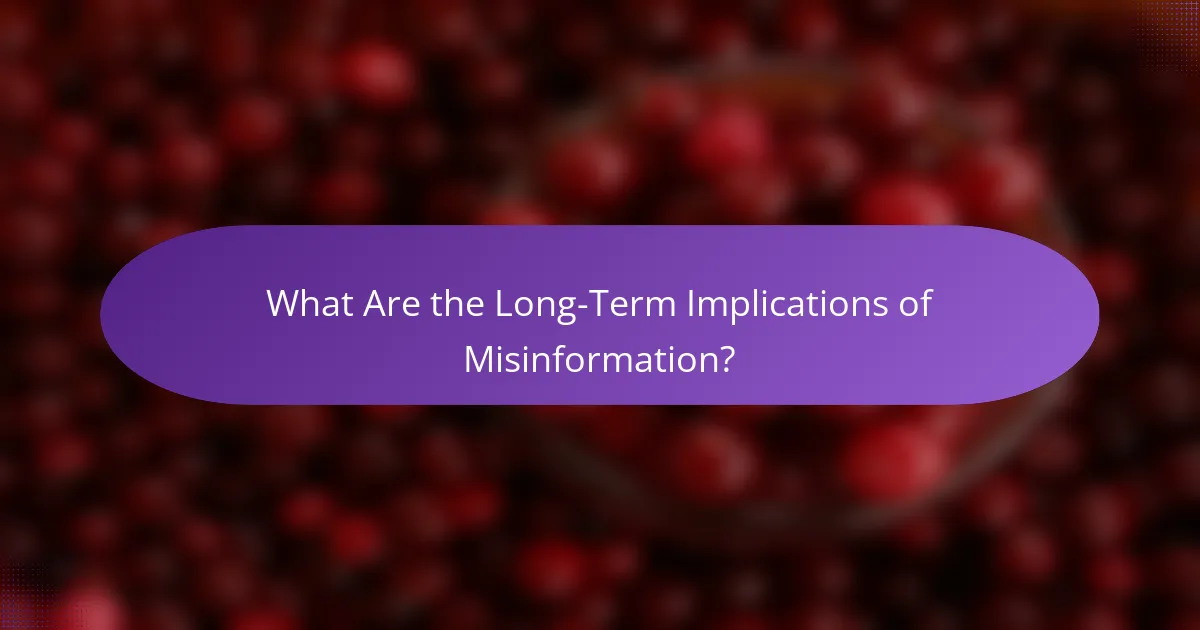
What Are the Long-Term Implications of Misinformation?
The long-term implications of misinformation can significantly undermine democratic processes and erode public trust. Over time, persistent falsehoods can distort public perception, influence voter behavior, and create divisions within society.
Impact on future elections
Misinformation can heavily influence future elections by shaping voter beliefs and preferences based on false narratives. For instance, misleading information about candidates’ policies or personal lives can sway undecided voters, potentially altering election outcomes.
Moreover, the spread of misinformation can lead to voter apathy or cynicism, as individuals may feel disillusioned by the political process. This can result in lower voter turnout and engagement, further destabilizing democratic institutions.
Changes in public discourse
The prevalence of misinformation alters public discourse by fostering an environment where falsehoods are treated as valid opinions. This shift can lead to polarized discussions, where individuals are less likely to engage with opposing viewpoints and more inclined to reinforce their own beliefs.
Additionally, misinformation can diminish the quality of debate, as discussions become focused on debunking false claims rather than addressing substantive issues. This can create a cycle where misinformation thrives, making it increasingly challenging to reach consensus on important societal matters.
